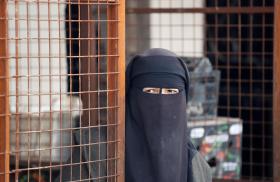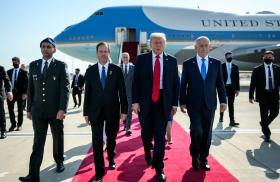"The PA was born out of the Palestine Liberation Organization (PLO), which was known for a long time as an aging, ineffective, corrupt, and poorly managed institution . . ."
Why Reform?
"While Palestinians should embark on a reform process guarded by Palestinian interests and internal conditions, Israel, with all the might and influence it has on the country, may play a determining role in the Palestinian infrastructure, good governance, and alter the current mode of governance. With current realities at hand, it is only logical to ask whether a political, social, and security situation on the ground permits for a genuine reform agenda in the absence of a roadmap to Palestinian independence.
"On the other hand, reform should be embarked upon as the only means for survival of Palestinian aspirations. The apparent conditioning of resumption in the peace process on reform and changes of leadership in the PA will likely backfire and lead to further deterioration on the ground. For a typical Palestinian, reform should be seen as the most proper means for empowerment and enhancing personal security and the standard of living—not as a response to conditions set by external pressure. The suggested framework for reform will have to be in response to internal needs, while taking into consideration commitments set out by the interim agreement with Israel. . . ."
Political Reform
"One of the major weaknesses of the Palestinian cabinet is the fact that it does not meet. They meet every week for three hours, but they never discuss issues relating to governance and the work of the government. There is a great mix-up between the role of the cabinet as overlooking the interests of the people, and the program of development . . . and the fact that this cabinet deals with issues relating to the political context of the relationship with Israel and negotiations . . . and the government is left without any directions or guidance to follow.
"In this regard, I think the PLO's role should be limited to overlooking the process of negotiations with the Israelis and the political functioning it assumes, leaving the management of the process of statehood and the daily life of the Palestinians to the PA.
"A primary step in the reform process should be a genuine and comprehensive review of government conduct, perceived mandates, and programs in relation to needs and potentials, efficiency, track records, the ability to respond to needs, and service orientation. The PA should also work toward following up on ratified laws in order to make them applicable, and this is extremely important. It is not enough for the president to sign laws. It is not really enough for the Legislative Council to ratify laws. Ratifying and signing them does not mean application of these laws.
"There is a culture of not applying laws in [Palestine]. Many of the laws that have been ratified and signed are still sitting there, not being practiced. And not only the basic law—we are speaking of the most recent, just before the intifada—the labor law was ratified, but it was never put into application. So, signing laws is not enough in this regard. . . ."
How to Advance Reforms
"An increased donor role in supporting the process is vital. This role could be one of overlooking the process and conducting a performance appraisal on a regular basis. It is worth, in this regard, to look into the establishment of an independent, custodian-like group of donors to see to it that proposed steps are followed, difficulties are overcome, resources are mobilized, and Israeli measures to facilitate the process are taken. I believe that we have already lost the ability to generate the potential that is required to complete the reform process. Therefore, some kind of an external, custodian-like setup is probably a good step to be taken.
"Conditions required to create an enabling environment are partly in the hands of Israel. Practical steps to ease the suffering of the people—such as closures, movement, humanitarian support, release of funds to support the functioning of the PA—are essential. Cessation of Israeli military activities that lead to greater suffering is crucial . . .
"In the meantime, the PA has to launch a rigorous campaign within the Palestinian public in support of peaceful means of expression. I think one of our problems is that up to this point, officially, the PA has not led in the efforts of convincing the public, or leading the public, influencing the public opinion that we have agreements, and probably some activities could take place, but they have to be through peaceful means. The PA is neutral in this regard . . .
"General elections have been set, at least there was some announcement that they will be in January. Some decree will be issued very soon, but what is the election agenda, in this context, within the situation that the Palestinians are living in? Who is going to be able to campaign against suicide bombers? Who is going to be able to campaign, even to campaign in favor of a peaceful relationship with Israel, while the Palestinians are not able to move from one place to the other, are suffering, are seeing their neighbors and loved ones being killed on a daily basis? So while there is a lot of emphasis on the need for elections as a way of producing credible, accountable, democratic leadership, if we do not work on producing the environment allowing for those Palestinians who are willing to campaign for peaceful coexistence with Israel, the elections will only produce more radicals . . ."
Policy #393


